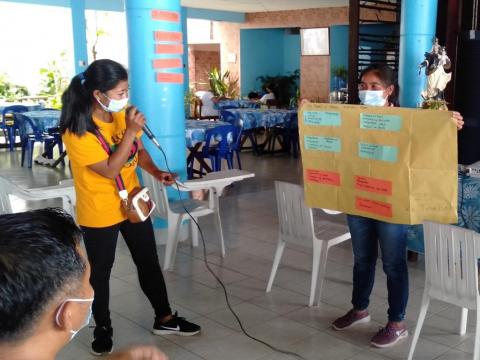Training participants present their outputs in one of the activities during the training
Cebu is the top producer of corn in Central Visayas, while Negros Oriental comes next after Cebu. Next to rice, corn is the second staple food for us, Filipinos. Households in the rural areas engage in corn production for their own consumption. However, increase of corn productivity has always been the primary concern in every agricultural development effort.
The goal for the corn program is to increase the production of quality corn for human consumption, feeds and industrial uses, as well as empower the farmers and increase their income, thereby improving the quality of life.
Two batches of Corn-based Farming System in Support to Gender and Development training were conducted in Cebu and Negros Oriental on 16 – 18 March 2021 and 13 - 15 April 2021, respectively.
The training in Cebu was attended by 20 farmers: 10 farmers from Bogo City and 10 farmers from Tabogon. Bogo City and Tabogon are among the top corn producers in the province of Cebu. While the training in Negros Oriental was attended by 21 farmers from the municipalities of Amlan, Bacong, Dumaguete and Valencia.
The training also looked into gender and development (GAD) aspects. Here, both men and women agricultural extension workers and farmers were given equal opportunity to join the training. In total, 41 farmers completed the three-day training: 10 female and 10 male from Cebu, and 6 female and 15 male from Negros Oriental.
Each of the participants was able to receive one bag of OPV corn seeds, one bag of vermicast, one bag of complete fertilizer, one kilo of peanut seeds and one kilo of mongo seeds.
The training was facilitated by Jeffrey O. Awas, Project Officer. The training in Cebu was assisted by Arnel S. Navarro, member of the training management team. Invited resource persons in Cebu were corn coordinators from the Agriculture’s Office in Bogo City, San Remigio and Tabogon. The training in Negros Oriental was assisted by Ryan Joshua Villena as training management team member. Invited resource persons in Negros Oriental were Angelina L. Bondad, George Ubag, Jose Proceso G. Inopia and Rhandee Kim V. Otodera of Provincial Agriculture’s Office in Negros Oriental.

